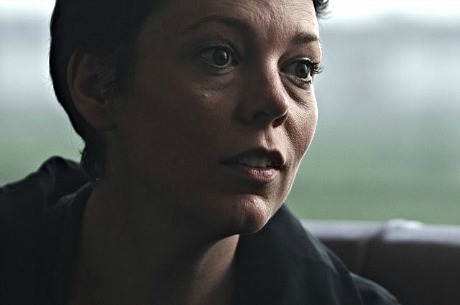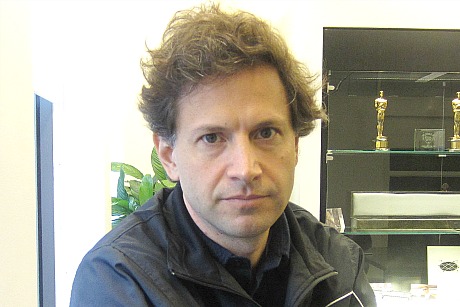Daily
Further Refinement
I’ve just put up some category projections in Oscar Balloon. The contenders are listed in order of likelihood and/or preference. Exceptions and disputations and the pointing out of arguable omissions are welcome. I haven’t gotten around to Best Original Screenplay and Best Adapted Screenplay contenders.
Likeliest Best Picture Contenders: 1. Moneyball (d: Bennett Miller). 2. The Descendants (d: Alexander Payne); 3. War Horse (d: Steven Spielberg); 4. Extremely Loud and Incredibly Close (d: Stephen Daldry, screenwriter: Eric Roth); 4. Tinker Tailor Soldier Spy (d: Tomas Alfredson); 5. The Girl With The Dragon Tattoo (d: David Fincher); 6. The Iron Lady (d: Phyllida Lloyd); 7. J. Edgar (d: Clint Eastwood); 8. The Help (d: Tate Taylor); 9. The Artist (d: Michel Hazanavicius); 10. Midnight in Paris (d: Woody Allen).
Likeliest Best Director Contenders: 1. Bennett Miller, Moneyball; 2. Alexander Payne, The Descendants; 3. Steven Spielberg, War Horse; 4. Stephen Daldry, Extremely Loud & Incredibly Close; 5. Tomas Alfredson, Tinker, Tailor, Soldier, Spy; 6. David Fincher, The Girl with the Dragon Tattoo. 7. Clint Eastwood, J. Edgar.
Likeliest Best Actor Contenders: 1. Brad Pitt, Moneyball.; 2. George Clooney, The Descendants; 3. Gary Oldman, Tinker Tailor Soldier Spy; 4. Woody Harrelson, Rampart; 5. Leonardo DiCaprio, J. Edgar; 6. Joseph Gordon Levitt, 50/50; 7. Jean Dujardin, The Artist. 8. Michael Fassbender, Shame/A Dangerous Method; 9. Michael Shannon, Take Shelter. SPECIAL DISPENSATION: Damian Bichir, A Better Life.
Likeliest Best Actress Contenders: SPECIAL DISPENSATION: Olivia Colman, Tyrannosaur…which needs to be seen because Colman absolutely kills in this British-made drama — just ask Guy Lodge. 1. Glenn Close, Albert Nobbs; 2. Meryl Streep, The Iron Lady; 3. Viola Davis, The Help [even though Davis’s role is definitely not a lead]; 4. Charlize Theron, Young Adult; 5. Tilda Swinton, We Need to Talk About Kevin; 6. Rachel Weisz, The Deep Blue Sea; 7. Michelle Williams, My Week with Marilyn.
Likeliest Best Supporting Actor Contenders: 1. Christopher Plummer, Beginners, Barrymore, Girl With The Dragon Tattoo; 2. Andy Serkis, Rise of the Planet of the Apes; 3. Albert Brooks, Drive; 4. Phillip Seymour Hoffman, Moneyball, Ides of March; 5. Jonah Hill, Moneyball; 6. Corey Stohl, Midnight in Paris; 7. Tom Hardy, Warrior, Tinker Tailor Soldier Spy, Wettest Counbtry in World; 8. Jim Broadbent, The Iron Lady.
Likeliest Best Supporting Actress Contenders: 1. Vanessa Redgrave, Coriolanus; 2. Shailene Woodley, The Descendants; 3. Viola Davis, Octavia Spencer, The Help; 4. Sandra Bullock, Extremely Loud and Incredibly Close; Jessica Chastain, Take Shelter, The Help, The Tree of Life.
Do The Right Thing
For the last eight months too many people have been asleep regarding Olivia Colman‘s shattering performance in Paddy Considine‘s Tyrannosaur (Strand, 11.18). Awards-season watchers have to be responsible and stop ignoring the clamor. I haven’t seen a lead female performance this year that comes close to matching Colman’s in terms of sensitivity, raw honesty and searing emotional exposure. It really is the shit.

It would be criminal to overlook Tyrannosaur for Colman’s sake alone. You can’t call yourself a serious entertainment journalist or an award-season columnist and not see it and give her your full consideration. Colman is this year’s Lesley Manville, only more so.
Colman plays Hannah, a 30ish middle-class wife dealing with a battering husband and an alcohol issue to boot, running a second-hand Christian charity shop in Leeds. The story is about her character befriending Joseph (Peter Mullan), a 50ish divorcee with a massive anger and alcohol problem, and their bond slowly developing as Hannah’s issues with her revolting prick of a husband (Eddie Marsan) come to a head. It sounds rough, but it’s finally a movie about tenderness.
There mignt not be much money to support Colman making a bid for awards attention, or none to speak of. She’d have to hire a p.r. firm and tour around, etc.. Strand is a very budget-conscious distributor so there won’t be much help on that end. But Colman really kills in this film, and you can’t just turn your head and pretend she’s not there or that she hasn’t delivered a legendary performance.

(l. to r.) Paddy Considine, Peter Mullan, Olivia Colman.
"This is Reality, Greg"
An awards-season handicapper said this morning that while Brad Pitt as Best Actor and a Best Adapted Screenplay nomination are strong possibilities, he’s not yet counting Moneyball as a Best Picture candidate. To which I replied: “The Aaron Sorkin-authored The Social Network averaged a 96% critical approval on Rotten Tomatoes, and won Best Picture from every critics group in the country except…was it San Diego’s? The partly-Sorkin-authored Moneyball is right now averaging 94% and inspiring waves of pleasure among the best critics, many of whom are calling it ‘the Social Network of baseball flicks’, and you’re not calling it a Best Picture candidate”?
Best Actor Dispute
This morning a journalist friend actually said that it’s not a safe assumption that The Descendants‘ George Clooney and Moneyball‘s Brad Pitt will be Best Actor-nominated “unless a couple of stronger performances in smaller movies like Shame‘s Michael Fassbender or The Artist‘s Jean Dujardin get bumped.” And what about Michael Shannon in Take Shelter, he added, or Joseph Gordon Levitt in 50/50?
The guy’s first statement is not correct. It is a safe assumption that Clooney and Pitt will be nominated. It can be safely assumed, in fact, that one or the other will win.
Academy members support and vote for actors whom they want to fuck, or at least bring home for dinner and invite to hang out and watch a football game with or whatever. So stop dweebing out here — Pitt and Clooney are the two lead contenders right now, period.
In Shame, Fassbender plays an icy, seriously damaged sex addict as if he, Fassbender the actor, is an icy, seriously damaged sex addict. This is a riveting inhabiting of a spiritually-dead zombie…terrific. Not since Donald Sutherland‘s performance in Felllini Casanova have we seen such a stirring portrayal of a sex jackhammer who can’t feel intimacy. Plus there’s that horse-sized wang that Fassbender shows off. And Fassbender’s Carl Jung is an equally (or close to equally) buttoned-up, highly repressed fellow in A Dangerous Method.
And Dujardin lays on the movie-king charm and the 1920s silent-film pizazz & career-collapse gloom in The Artist — he has a great smile and eyes that are full of life and sparkle.
But neither Fassbender nor Dujardin’s performance comes even close to what Pitt delivers in Moneyball — the doggedness, the anger, the brusque charm, the baseball backstory, the tenacity, the daughter love, etc. Plus he’s delivering the old movie-star charisma that we love so well. And Clooney delivers a touching, fully lived-in dad also — weary, grief-numbed, father-daughter love — who experiences a growth arc.
In short, 2011 is pretty much locked-in in this cateogry as the year of the hunk dads.
To borrow Pitt’s line from Moneyball, there’s Pitt and Clooney, and then there’s Woody Harrelson in Rampart and then possibly Leonardo DiCaprio in J. Edgar (but don’t count on it), and then two or three levels below there’s Dujardin, and then there’s 50 feet of crap, and then there’s Fassbender, the icy Frankenstein sex-addict.
So don’t even talk about Fassbender being within throwing distance of Pitt and Clooney’s realm. Forget it…forget it right now.
Take Shelter‘s Michael Shannon does an excellent job of getting inside that guy’s skin, but I personally don’t relate to guys who feel they have to hide it all away and “be strong” and not share anything with their wives. (You know who’s REALLY good in this film? Jessica Chastain.) And so I didn’t feel that close to Shannon’s character — I didn’t feel I understood him or could relate to him (like I could understand & relate to Ben Stiller‘s Greenberg, for instance) or that he was playing on my home team.
And you know that most people do not look at Shannon as a guy they want to fuck or invite over for dinner or a ball game. (I personally like Shannon, whom I’ve met and sat down with, and would some day love to hang with him at a Yankees or Giants game.) He always seems to connect when he plays someone mentally or emotionally unbalanced, the Revolutionary Road guy being the last instance. But the RR guy was cool — a truth-teller, an illusion-shatterer. His Take Shelter guy is a hider, a scared-and-fucked-up guy and not that smart about using job equipment on the weekend for a personal backyard job, and emotionally irresponsible.
Right now it’s Pitt, Clooney, Gary Oldman in Tinker Tailor, DEFINITELY Woody Harrelson in Rampart, possibly DiCaprio in J. Edgar if the film turns out well, and Joseph Gordon Levitt in 50/50 — easily the most winning performance he’s given since 500 Days of Summer.
WHOM DOES THE AVERAGE ACADEMY MEMBER WANT TO BE ON INTIMATE TERMS WITH, OR HAVE OVER FOR DINNER OR GET DRUNK WITH, THE MOST? Pitt and Clooney, tied for first. Then Harrelson, and then DiCaprio, and then Gordon Levitt, and then Oldman and Dujardin (who speaks English, just to be clear).
Accurate
In a Piers Morgan interview airing tonight, Morgan Freeman flat-out declares that the Tea Party’s anti-Obama fervor is driven by racism. “Their stated policy, publicly stated, is to do whatever it takes to see to it that Obama only serves one term,” Freeman says. “What’s…what does that, what underlines that? ‘Screw the country. We’re going to whatever we do to get this black man, we can, we’re going to do whatever we can to get this black man outta here.'”

Derby Best Picture Picks
The Best Picture preferences of the Gold Derby team (to which I belong) have been posted, and boy, are some these predictions weird! The percentages were tabulated by including predictions of various “experts” (i.e., columnists like myself) along with editor odds and preferences. Don’t ask me to explain the calculus but at least there are some rankings to start with.
The leading default choice for Best Picture is Steven Spielberg‘s War Horse because of (a) the kneejerk Spielberg kowtow factor (i..e, obeisance before power), and (b) because journalists believe that the film will make people cry. George Clooney‘s The Ides of March is second-ranked, and that’s not going to happen — it’s a very solid adult-angle political drama but it’s not Best Picture material. Alexander Payne‘s The Descendants is third, and that will definitely happen, for sure. Then comes Stephen Daldry‘s Extremely Loud and Incredibly Close…maybe. And then Michel Hazanavicius‘ The Artist…probably.
Clint Eastwood‘s J. Edgar is ranked sixth based on…what? Because no one seems to think that the trailer offers a lot of encouragement. JJ Abrams‘ Super 8 is next…really? It’s a summer genre film with good performances. David Fincher‘s The Girl With The Dragon Tattoo is ranked eighth, and then Bennett Miller‘s Moneyball is ninth with The Help coming in tenth.
My personal predictions (in this order): Moneyball, The Descendants, War Horse (who knows?), The Help, Tinker Tailor Soldier Spy, The Girl With The Dragon Tattoo (ditto), Extremely Loud and Incredibly Close (ditto) and possibly Midnight in Paris.
"Your Own Chemicals"
Here’s the mp3 of my 9.21 Sony headquarters chat with Moneyball director Bennett Miller. It’s odd but as we were speaking a voice was telling me that Bennett was going too slow and taking too long to articulate this or that response, but listening to it today he sounds fine. He explains it all quite clearly.

Bennett Miller at Sony headquarters at 550 Madison — Wednesday, 9.21, 4:40 pm.
It starts out a little raggedy (audio of my taking his picture, etc.) but I like it that way.
Excerpt #1: “Nobody wants to see a baseball movie, I thought to myself. Outside of this country [the genre is] challenging and even inside….historically they don’t [perform] as well as people might imagine. So I didn’t want to do ‘a baseball movie’, but baseball is an interesting medium by which to tell another story. It’s about Billy [Beane] coming to believe that there was a life that he was supposed to be living, that he wasn’t living. So like a Wizard of Oz or King Arthur story…it’s about somebody who’s displaced or dislocated with the life they have, and they’re a little bit lost, and they’re presented with some kind of impossible challenge, [the deal being] that if you do this thing, be it getting the witch’s broomstick or capturing the Holy Grail, your life will be restored.”
Excerpt #2: “I got a phone call from my agent, Bryan Lourd. I hadn’t really been a baseball fan since I was a kid, not that much, yes and no. And Bryan said, you wanna take a look at this thing? ‘Cause if you’re interested Brad would like to talk to you. So I read everything…the scripts, the book, thought about it…came up with an approach that I thought would be worth the labor of a few years. This is how I see it, I said to Brad. How do you see it?> And we were really compatible. I asked him questions. Why do you want to play this thing? I see it in such a way. If you don’t feel the seme way, no harm, no foul. If we’re all making the same movie, that’s fantastic. But if we’re not, no one’s going to be happy, ever.”
Excerpt #3: “I urge you…I urge you to speak to Mychael Danna, the composer. I think this was the hardest job of his life…one of the most difficult things to get right. He’s very proud of it and I’m in love with it…but it was hard to get to. It’s not literal. It’s not representative in the way that ‘cue’ music often is. The score attempts to conjure a kind of concsiousnes that allow us to observe the story instead of our telling it. The style of this movie is observaitonal. To conjure up a kind of conscousness…movies in which you feel you;re right inside the brain of the filmmaker. There are no fingerprints, but you feel as if you;ve got someone else’s brain in your head. It’s meant to release your own chemicals.”


